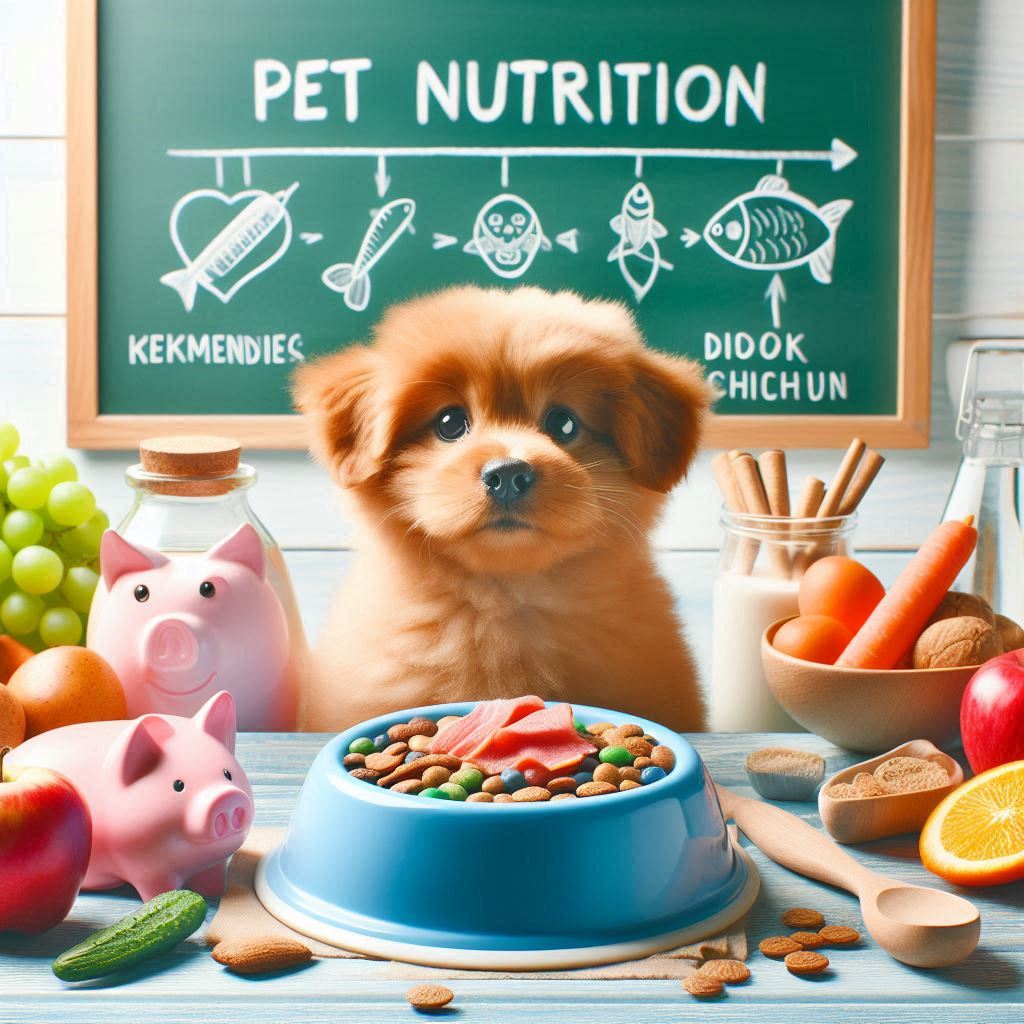Introduction
Providing proper nutrition for your pet is crucial to their health, longevity, and overall well-being. Every pet, whether it’s a dog, cat, bird, fish, or exotic animal, has specific dietary needs that must be met to ensure they thrive. This comprehensive guide will cover the dietary requirements of various pets, common nutritional concerns, and tips for maintaining a balanced diet.
1. The Basics of Pet Nutrition
Macronutrients
- Proteins: Essential for growth, repair, and maintenance of body tissues. Key component of enzymes and hormones.
- Fats: Provide energy, aid in the absorption of vitamins, and contribute to healthy skin and coat.
- Carbohydrates: Source of energy, though not as essential for carnivorous pets. Important for fiber.
Micronutrients
- Vitamins: Organic compounds necessary for metabolic processes. Different pets require different vitamins.
- Minerals: Inorganic elements essential for bone health, nerve function, and muscle contraction.
Water
- Hydration: Critical for all pets to maintain bodily functions. Fresh water should always be available.
2. Dog Nutrition
Essential Nutrients for Dogs
- Proteins: Dogs need high-quality animal proteins from sources like chicken, beef, lamb, and fish.
- Fats: Essential fatty acids like omega-3 and omega-6 support skin and coat health.
- Carbohydrates: Grains, vegetables, and fruits provide energy and fiber.
Feeding Guidelines
- Puppies: Require higher protein and fat for growth. Feed puppy-specific food.
- Adults: Balanced diet with appropriate portions to maintain healthy weight.
- Seniors: Lower calorie intake with added joint support supplements.
Common Dietary Concerns
- Obesity: Caused by overfeeding and lack of exercise. Monitor calorie intake and provide regular exercise.
- Allergies: Symptoms include itching, ear infections, and gastrointestinal issues. Identify and eliminate allergens.
- Digestive Issues: High-fiber diets and probiotics can aid digestion.
Homemade vs. Commercial Diets
- Homemade Diets: Requires careful balance of nutrients. Consult a vet or pet nutritionist.
- Commercial Diets: Convenient and formulated to meet nutritional needs. Choose high-quality brands.
3. Cat Nutrition
Essential Nutrients for Cats
- Proteins: Cats are obligate carnivores and need high levels of animal protein.
- Fats: Essential for energy and health. Sources include chicken fat, fish oil, and plant oils.
- Taurine: An amino acid crucial for heart health, vision, and reproduction.
Feeding Guidelines
- Kittens: Need nutrient-dense food for growth and development. Feed kitten-specific formulas.
- Adults: Balanced diet with proper portion control to avoid obesity.
- Seniors: Lower calorie intake with added joint support and easy-to-digest ingredients.
Common Dietary Concerns
- Urinary Health: Feed wet food or add water to dry food to prevent urinary tract issues.
- Weight Management: Monitor food intake and provide regular exercise through play.
- Hairballs: High-fiber diets can help reduce hairballs.
Dry vs. Wet Food
- Dry Food: Convenient and helps with dental health. Ensure adequate water intake.
- Wet Food: Higher moisture content helps with hydration. More palatable for picky eaters.
4. Bird Nutrition
Essential Nutrients for Birds
- Seeds and Pellets: Balanced diet of seeds, pellets, and fresh fruits/vegetables.
- Calcium: Crucial for egg-laying birds. Provide cuttlebone or calcium supplements.
- Vitamins and Minerals: Supplements may be needed, especially vitamin A and D.
Feeding Guidelines
- Parrots: Require a varied diet including pellets, fruits, vegetables, and nuts.
- Canaries and Finches: Primarily seed-based diet with additional fresh greens and egg food.
- Budgies: Balanced diet of seeds, pellets, and fresh foods.
Common Dietary Concerns
- Malnutrition: Avoid all-seed diets. Provide a balanced mix of seeds, pellets, and fresh foods.
- Obesity: Monitor portion sizes and provide opportunities for flight and exercise.
- Vitamin Deficiencies: Provide a varied diet and consider supplements if necessary.
Toxic Foods to Avoid
- Avocado: Toxic to most birds and can cause serious health issues.
- Chocolate and Caffeine: Harmful to birds, causing hyperactivity and potential heart problems.
- Alcohol: Extremely dangerous and should never be given to birds.
5. Small Mammals Nutrition
Essential Nutrients for Small Mammals
- Rabbits: High-fiber diet with unlimited hay, fresh vegetables, and limited pellets.
- Guinea Pigs: Require vitamin C in their diet, high-fiber hay, fresh vegetables, and pellets.
- Hamsters and Gerbils: Balanced diet of seeds, grains, fruits, and vegetables.
Feeding Guidelines
- Rabbits: Unlimited hay, fresh vegetables, and a small amount of pellets.
- Guinea Pigs: Fresh hay, vitamin C-rich vegetables, and guinea pig-specific pellets.
- Hamsters and Gerbils: Variety of seeds, grains, and occasional fruits/vegetables.
Common Dietary Concerns
- Dental Health: Provide chew toys and high-fiber diets to prevent overgrown teeth.
- Obesity: Monitor portion sizes and avoid high-fat treats.
- Digestive Issues: Ensure a balanced diet with plenty of fiber.
Safe Treats and Foods
- Rabbits: Fresh leafy greens, small amounts of fruit, and herbs.
- Guinea Pigs: Bell peppers, kale, parsley, and small fruit pieces.
- Hamsters and Gerbils: Fresh vegetables, whole grains, and occasional fruits.
6. Reptile Nutrition
Essential Nutrients for Reptiles
- Carnivorous Reptiles: Require a diet of live prey like mice, insects, or fish.
- Herbivorous Reptiles: Fresh vegetables, fruits, and greens. Avoid high-oxalate foods.
- Omnivorous Reptiles: Combination of animal protein and plant matter.
Feeding Guidelines
- Snakes: Feed appropriately sized prey based on the snake’s size and age.
- Lizards: Diet varies by species. Research specific needs for herbivorous or carnivorous lizards.
- Turtles and Tortoises: Fresh vegetables, leafy greens, and protein sources like insects or fish.
Common Dietary Concerns
- Nutritional Deficiencies: Provide a balanced diet and consider supplements for calcium and vitamins.
- Obesity: Monitor portion sizes and avoid overfeeding high-fat foods.
- Hydration: Ensure access to clean water and proper humidity levels.
Safe Food Choices
- Herbivorous Reptiles: Collard greens, dandelion greens, squash, and carrots.
- Carnivorous Reptiles: Live prey like crickets, mealworms, and mice.
- Omnivorous Reptiles: A mix of insects, leafy greens, and fruits.
7. Fish Nutrition
Essential Nutrients for Fish
- Proteins: Crucial for growth and repair. Provided through commercial fish food and live/frozen food.
- Fats: Essential for energy and overall health.
- Vitamins and Minerals: Supplements may be added to water or food.
Feeding Guidelines
- Tropical Fish: High-quality flakes, pellets, and occasional live/frozen food.
- Goldfish: Specialized goldfish food and fresh vegetables.
- Saltwater Fish: Variety of commercial food, live/frozen food, and algae.
Common Dietary Concerns
- Overfeeding: Can cause water quality issues and health problems. Feed small amounts twice a day.
- Nutritional Deficiencies: Provide a varied diet to ensure all nutritional needs are met.
- Water Quality: Maintain clean water to prevent diseases and promote health.
Safe Food Choices
- Tropical Fish: Flakes, pellets, brine shrimp, and bloodworms.
- Goldfish: Specialized food, peas, spinach, and lettuce.
- Saltwater Fish: Marine flakes, pellets, mysis shrimp, and seaweed.
8. Exotic Pet Nutrition
Essential Nutrients for Exotic Pets
- Ferrets: High-protein diet with animal-based proteins. Avoid plant-based diets.
- Hedgehogs: Balanced diet of insects, fruits, vegetables, and high-quality cat food.
- Sugar Gliders: Variety of fruits, vegetables, insects, and specialized sugar glider food.
Feeding Guidelines
- Ferrets: High-protein kibble, occasional raw meat, and limited fruits/vegetables.
- Hedgehogs: Insect-based diet with fruits and vegetables.
- Sugar Gliders: Fresh fruits, vegetables, and protein sources like insects or lean meats.
Common Dietary Concerns
- Obesity: Monitor food intake and provide exercise opportunities.
- Dental Health: Provide appropriate chew toys and foods to maintain dental health
.
- Nutritional Deficiencies: Ensure a balanced diet and consider supplements if necessary.
Safe Food Choices
- Ferrets: High-quality ferret food, raw meat, and limited fruits/vegetables.
- Hedgehogs: Mealworms, crickets, apples, and carrots.
- Sugar Gliders: Papaya, apples, mealworms, and specialized food.
9. Common Pet Nutrition Myths
Myth 1: Grain-Free Diets are Always Better
- Fact: Grain-free diets are not necessary for all pets. Some pets thrive on diets with grains.
Myth 2: Table Scraps are Safe for Pets
- Fact: Many human foods are toxic to pets. Stick to pet-specific foods.
Myth 3: Raw Diets are the Healthiest Option
- Fact: Raw diets can pose health risks due to bacteria and nutrient imbalances.
Myth 4: Supplements are Always Needed
- Fact: Balanced commercial diets often provide all necessary nutrients. Supplements should be used only under veterinary guidance.
Myth 5: Cats and Dogs Can Share the Same Food
- Fact: Cats and dogs have different nutritional needs. Feeding the wrong food can lead to deficiencies.
10. Tips for Maintaining a Balanced Diet for Your Pet
Regular Veterinary Check-Ups
- Importance: Regular vet visits help monitor your pet’s health and nutritional status.
- Action: Schedule annual check-ups and discuss dietary needs with your vet.
Proper Portion Control
- Importance: Prevents obesity and ensures your pet receives the right amount of nutrients.
- Action: Follow feeding guidelines and adjust portions based on your pet’s activity level and weight.
Fresh Water Availability
- Importance: Hydration is crucial for all pets.
- Action: Provide clean, fresh water at all times and check water bowls or bottles daily.
Reading Food Labels
- Importance: Understanding food labels helps you choose high-quality food.
- Action: Look for complete and balanced diets, appropriate protein sources, and avoid artificial additives.
Variety in Diet
- Importance: Prevents nutritional deficiencies and keeps pets interested in their food.
- Action: Rotate protein sources, include fresh fruits/vegetables, and consider different types of commercial food.
Avoiding Toxic Foods
- Importance: Some human foods are harmful to pets.
- Action: Research and avoid toxic foods like chocolate, onions, garlic, grapes, and alcohol.
Monitoring Health and Behavior
- Importance: Changes in health or behavior can indicate dietary issues.
- Action: Observe your pet regularly and consult your vet if you notice changes in appetite, weight, or energy levels.
Conclusion
Understanding the dietary needs of different pets is essential for providing the best care and ensuring their health and happiness. Each pet has unique nutritional requirements that must be met through a balanced diet, proper portion control, and regular veterinary care. By staying informed and attentive to your pet’s needs, you can help them lead a long, healthy, and fulfilling life. Remember to consult with a veterinarian or pet nutritionist to tailor your pet’s diet to their specific needs and to address any concerns you may have.


